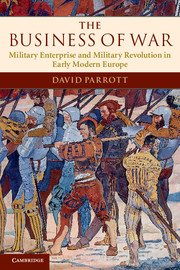Book contents
- Frontmatter
- Contents
- Figures
- Maps
- Acknowledgements
- Abbreviations
- Currencies
- Introduction
- Part I Foundations and expansion
- 1 Military resources for hire, 1450–1560
- 2 The expansion of military enterprise, 1560–1620
- 3 Diversity and adaptation: military enterprise during the Thirty Years War
- Part II Operations and structures
- Notes
- Bibliography
- Index
1 - Military resources for hire, 1450–1560
Published online by Cambridge University Press: 05 January 2015
- Frontmatter
- Contents
- Figures
- Maps
- Acknowledgements
- Abbreviations
- Currencies
- Introduction
- Part I Foundations and expansion
- 1 Military resources for hire, 1450–1560
- 2 The expansion of military enterprise, 1560–1620
- 3 Diversity and adaptation: military enterprise during the Thirty Years War
- Part II Operations and structures
- Notes
- Bibliography
- Index
Summary
This battle of Anghiari (1440) lasted two hours, during which first Niccolò [Piccinino] and then the Florentine troops were masters of the bridge . . . Niccolò’s troops won the bridge many times, and always they were repelled by the fresh troops of their adversaries. But when the bridge was won by the Florentines, so that their troops gained the road, Niccolò did not have time, because of the fury of those who came and the inconvenience of the site, to relieve his men . . . the whole army was compelled to turn round and everyone fled toward Borgo without any hesitation. The Florentine soldiers attended to the spoil, which was very great in prisoners, harnesses and horses . . .
Nor were there ever times when war waged in these countries or others was less dangerous for whoever waged it than these. In such a defeat . . . only one man died, and he not from wounds or any virtuous blow, but falling off his horse, he was trampled on and expired.
On 31 August 1515 the recently crowned king of France, François I, at the head of an army which had just crossed down into Italy, halted at Bufalora, 50 kilometres south of Milan. Standing between the king and his objective was the ruler of the Duchy, Massimiliano Sforza, and an army whose core was made up of 12,000–15,000 Swiss infantry. François had not neglected diplomatic efforts to gain Milan, and his agents had been in negotiations with the leaders of the Swiss since late August. Already 5,000 Swiss from Fribourg and Berne had accepted French terms and marched out of the Milanese. On 9 September a treaty was agreed by which the rest of the Swiss troops would accept 1 million écus to abandon the territories they occupied in the Milanese and their military contract with Sforza. Expecting merely to settle the details of the treaty, François and his army of around 30,000 men, together with the best artillery in Europe, moved to Marignano, where they established a well-fortified encampment. While this was going on, the Swiss debated what to do next. Half those present voted to accept the French offer and return home, but others from the eastern cantons argued that they were bound to honour their contract with Sforza.
- Type
- Chapter
- Information
- The Business of WarMilitary Enterprise and Military Revolution in Early Modern Europe, pp. 27 - 70Publisher: Cambridge University PressPrint publication year: 2012



